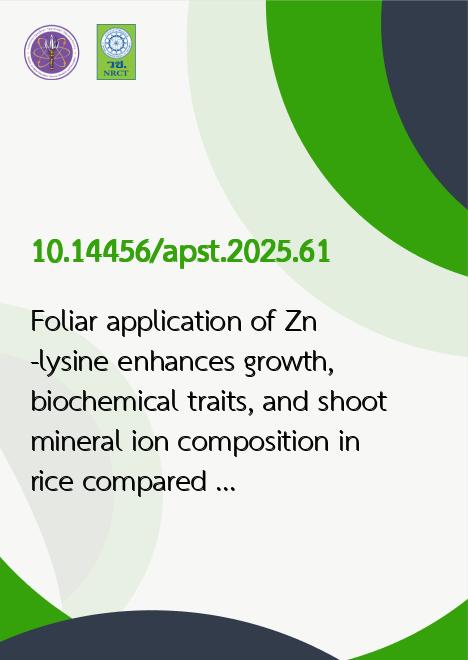
|
Foliar application of Zn-lysine enhances growth, biochemical traits, and shoot mineral ion composition in rice compared to zinc sulphate and L-lysine |
|---|---|
| รหัสดีโอไอ | |
| Creator | Muhammad Waqas Mazhar |
| Title | Foliar application of Zn-lysine enhances growth, biochemical traits, and shoot mineral ion composition in rice compared to zinc sulphate and L-lysine |
| Contributor | Adnan shahid |
| Publisher | Khon Kaen University, Thailand |
| Publication Year | 2568 |
| Journal Title | Asia-Pacific Journal of Science and Technology |
| Journal Vol. | 30 |
| Journal No. | 4 |
| Page no. | 12 (13 pages) |
| Keyword | Zinc biofortification, Oryza sativa L., foliar nutrition, antioxidant defence, chelated minerals |
| URL Website | https://apst.kku.ac.th/ |
| Website title | https://apst.kku.ac.th/foliar-application-of-zn-lysine-enhances-growth-biochemical-traits-and-shoot-mineral-ion-composition-in-rice-compared-to-zinc-sulphate-and-l-lysine/ |
| ISSN | 2539-6293 |
| Abstract | Zinc sulphate, when used as a fertilizer, often causes low bioavailability, soil fixation, leaching, and environmental risks. These limitations can be mitigated by using zinc amino acid chelates, which offer superior plant absorption and environmental sustainability. This study aimed to evaluate the effects of foliar-applied zinc sulphate (ZnSO₄), zinc-lysine chelate (Zn-Lys), and lysine on the biochemical attributes and growth of rice (Oryza sativa L.). A pot trial was conducted using a completely randomized design with eight treatments (No Spray, Water Spray, 0.50% and 1% ZnSO₄, 0.50% and 1% Zn-Lys, and 0.50% and 1% L-Lysine). Compared to the control (no spray), 1% Zn-Lys significantly enhanced biochemical, growth, and mineral parameters, with the highest increases in zinc content (28.9%), flavonoids (23.8%), total chlorophyll (39.4%), and superoxide dismutase activity (23.9%). Additionally, it improved shoot calcium, potassium, and magnesium contents while effectively reducing oxidative stress markers, including malondialdehyde (MDA) and hydrogen peroxide (H₂O₂). Growth indicators such as root dry weight (5.6%) and shoot fresh weight (15.5%) were also maximized with Zn-Lys. In contrast, 1% ZnSO₄ moderately improved nutrient content and enzyme activity, while 1% Lysine had minimal or inconsistent effects. These findings highlight Zn-Lys as the most effective treatment for enhancing rice growth, biochemical attributes, and stress resilience. |